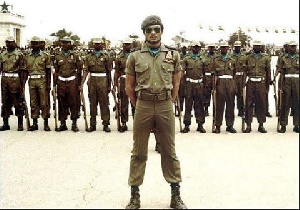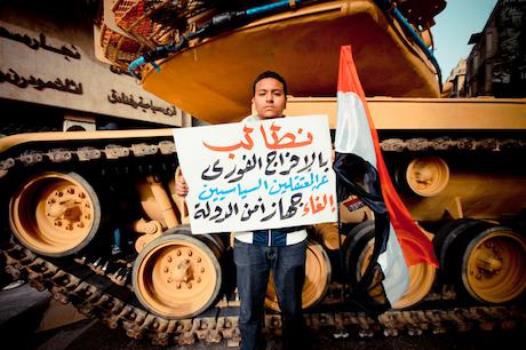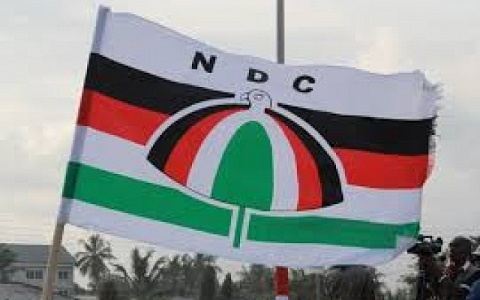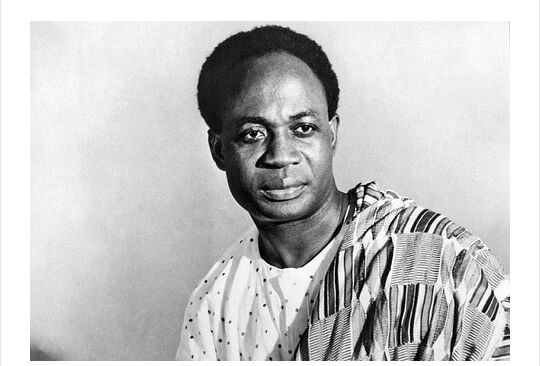 Former President Flt. Lt. Jerry John Rawlings
Former President Flt. Lt. Jerry John Rawlings
Ghana’s political history cannot be complete without a proper introspection, on the trajectory, events and lessons that characterized the dark stages in our political history as a country.
It is important to note that, those who forget where they come from normally don’t know where they must go. Nobody holds a torch light from the front, it is held from the back- it gives you more illumination, insight, focus and direction.
As a country born out of struggle with cohesive diversity and high sense of patriotism, it wasn’t too difficult as a people to feel and actualize the level of deprivation and hardship across the country in the early eighties. As the socio-economic and general cost of living conditions became unbearable and on rapid decline, under the leadership of Dr. Hilla Limann, and more the decline in social democratic principles- a human centred philosophy for socio economic development, there was a spontaneous massive call for restoring the social order-social justice, and giving hopes to the people of Ghana. This support came from diverse and collated quarters – workers, farmers, the youth, students and junior ranks of the Armed Forces – also from a growing number of intellectuals, lawyers, engineers and other professionals including members of the clergy and some senior officers of the Armed Forces.
This paper seeks to highlights the milestones and events that characterized the foundation of the Forth Republic in 1992, the values and principles that gave birth to the National Democratic Congress.
The Revolution:
According to the Cambridge Dictionary,’’ revolution is a change in the way a country is governed, usually to differentiate political system and often using violence or war. The French revolution changed a monarchy to a republic.’’ And a revolution Day or the Day of the Revolution refers to public holidays or remembrance days in various countries held in commemoration of an important event in the country's history, usually the starting point or a turning point in a revolution that led to significant political change. Revolution could also be technological, industrial or a social movement.
For instance, the Mexican Revolution brought the overthrow of liberal Army General Porfirio Díaz after 35 years as president of Mexico (1876-1911). In the 1910 presidential election, wealthy landowner Francisco I. Madero opposed Díaz. Díaz jailed Madero, who then escaped, issuing the Plan of San Luis Potosí on October 6, 1910. In that plan, Madero declared the results of the 1910 election fraudulent, nullified them, asserted that he was provisional president, and called for Mexicans to rise up against Díaz on November 20, 1910. He wrote "Throw the usurpers from power, recover your rights as free men, and remember that our ancestors left us a heritage of glory which we are not able to stain. Be as they were: invincible in war, magnanimous in victory."
The commemoration is celebrated in Mexico as an official holiday. Until 2006 and again from 2009 to 2013 the national celebrations were located at the Zocalo in Mexico City.
There are many political revolutions across the globe to mention but a few in modern days and in decades back:

Tunisia, January 14 (2011); Egypt, January 25 (2011). Also known as Egyptian Revolution Day. Marks the day of the beginning of the 2011 Egyptian revolution; Libya, February 17 (2011). Marks the day when Jamahiriya security forces first used live ammunition against Benghazi demonstrators, sparking the civil war.
Revolutions could be traced back to decades notably: Nicaragua, July 19 (1979). Also known as Liberation Day. Marks the day that the FSLN Army defeated the Somoza dictatorships in the Nicaraguan Revolution; The Gambia, July 22 (1994), Egypt, July 23 (1952), Vietnam, August 19 (1945); Libyan Arab Jamahiriya, September 1 (1969). In commemoration of the Green Revolution of Muammar Gaddafi; The Bolivian Revolution 1952-1964; Republic of Macedonia, October 11 (1941). Marks the beginning of the National Liberation War of Macedonia; Guatemala, October 20 (1944). One of two Patriotic Days, commemorates a coup d'état led by Francisco Javier Arana and Jacobo Arbenz Guzmán; Soviet Union, November 7 (1917). In commemoration of the October Revolution; Cuban Revolution conducted by Fidel Castro, 26th July 1953 and many others.
America equally had its portion between 1765 and 1783 which gave birth to independence from Great Britain to become the United State of America.
Ghana is not an exception to this searchable quest for freedom and social justice. The only variation is the scope, the geopolitics and the outcomes.
The Anecdotes of Ghana’s situation at the time
‘’The village school girl, Esi, reads under the burning flame of a locally made lantern light, but oil will soon run out and no hope for replacement.
The lad, Kofi, struggles with a fainting hunger in a suburb at the heart of Accra. He must wait for mama to mix some gari and beans to gain strength, before leaving for school, and that may be the only meal for the day.
Soon, the lights are off, soon, water is gone. The city boy Kwame Osei, climbs the storey buildings of the administrative blocks, seeking for a job all day long.
The baby girl, only two months old, refuses to be comforted on her mother’s arms for the lack of sufficient milk from her mother’s breast. Milk will flow if she would only have sufficient food to eat.
The situation looks hopeless for corruption seems chronically rooted.
The future is what those who rule are munching. They seem to be bent on eating it all. On their bellies is the script in italics, “We won’t shit, lest pigs have something to eat.” Hence, they hoard for selfish interest.
The political atmosphere uneasily tense; and the only certainty is the uncertain.
Military Generals gaze the other way, like to say, the day must stay the same. It is in this rude and polarized atmosphere that a junior officer with an extra ordinary courage would debunk the wrong. He will dismantle the ruling corrupt status quo, and like a new day dawn, there shall be light that will gradually shine to brighten not only the day but the faces of many Ghanaians as well.’’
The Emergence of a Saviour on the political scene

Flt. Lt. John Jerry Rawlings, the man Ghanaians will forever remember as a true statesman, crusader, humanitarian, the man of the people and a revolutionary, dismantled the intricate bundle of national hopelessness, mended the hope and protected it from the invasion of enemies within and without. A man who prevailed against all odds to defend the revolution and brought Ghana to a stable peaceful society.
There have been several attempts to curtail, if not block Rawlings' popularity and influence on the political scenes.
On the 31st December 1981, Rawlings led the popular uprising finally christened as 31st December Revolution, which toppled the Limann’s Era and the Third Republic. In a radio broadcast he called for “nothing less than a revolution” in which every citizen should shoulder his or her share of the responsibility for social justice and meaningful development. The Provisional National Defence Council (PNDC) was established, which included both military and civilian members.
In workplaces and communities, Defence Committees (PDCs and WDCs) were set up, which were later restructured as Committees for the Defence of the Revolution (CDRs) with clear and practical functions.
The Foundation and Pillars
The foundation with which a vision is built is more important than the dream itself. Vision precedes foundation, but what good is a foundation that will certainly crumble and soon? Such will only give people false hopes and let them be crushed to various forms of frustrations, and to depression. A virtuous vision that is backed with faith, truth and hard work is the best way, because it builds a strong foundation. Throughout his life, J.J Rawlings has looked at the cause of humanity with empathy and had always had serious concern on the suffering masses. Unlike many political leaders, it has not been the political drive, but the human situation that has been his motivation: How to take humanity one-step further into her true destiny.
Organizations are created to serve humanity and not the other way-round. Although many politicians may want to think that politics means the “evil game,” where back stabbing, calumny, blackmailing, lies, and where “the winner takes it all” culminates the race, great spirited people with good hearts, understand that politics is only a necessary evil so long as the leaders of the globe have not given value to the values that should make us great politicians. NDC can still become as strong as it used to be, if the spirit of its foundation is revamped. From inception, the party was created to serve the people, just to say the least. All leadership in the NDC must take serious note of that. Service to humanity is not easy to pursue, because humans have the natural tendency to want people to serve them rather than them being at service to others. It is the reason why to pursue and fulfil a vision, primordially, there must be a set of guiding principles.
The Principles
The National Democratic Congress (NDC) is a social democratic political party and this says a quantum words. Taking into cognizance that it’s not enough to be democratic, the foundation of the NDC was built with the spirit of love for the nation in a practical exercise of brotherhood. The limitation of democracy primarily comprises of the tendency where the majority sometimes, suppresses a few. In Social democracy, this is hoped to be minimized to some greater extent.
J.J Rawlings ruled Ghana as Head of State from 1981 to 1993, and the President of Ghana from 1993 to 2001. The Provisional National Defence Council (PNDC) which ruled Ghana following the military coup d'état on 31 December 1981, was given pressure from the international community to restore democracy and it wasn't an easy task considering the circumstances Ghana found herself in, in many wise. Amidst so much difficulties Rawlings didn't hesitate to take the challenge to ushered Ghana into the club of democratic nations of the world. During his leadership tenures, as a social democrat, J.J Rawlings was so much concerned about the kind of leadership he was going to leave after him in this type of democracy in the third world or emerging economies like ours.
Leadership without a moral compass is great temptation in the pond of power. There is no contradiction in the assertion that J.J Rawlings is the father of democracy in Ghana but beyond that, he has become the moral Compass in Ghanaian politics, and only those who are ignorant, see that differently.
We probably have no idea of what Ghana would have been if Rawlings stayed aloof or gave a deaf ear on the state of affairs in Ghana. Even now, Rawlings is deeply concerned about the kind of Ghana he will leave behind if the principles are not restored. It is his hope that the spirit with which NDC's foundation was created becomes that moral compass instead of a personality that will sooner or later be gone.
From the individual to the family, the society and to the nations, we’ll notice that the human tendency on egocentrism is inherently active in the human mind; thus, the world has been ran by a set of groups of people who seek very little good for others. From slavery to colonialism, and to neocolonialism, the world seems to be moving forward but in very harsh circumstances due to this human tendency. Even now, there may be enemies of Ghana who will like to see Ghana fall, and degenerate to a war zone for their profit sake. A leader, who is aware of these vices, cannot possibly sit comfortably on the shelves of politics or leadership, especially if he has his people at heart. What Rawlings wants for Ghana is not just a strong democracy, but a wholesome sustainable progress of Ghanaian in the right direction.
The NDC was born out of the principles of probity, accountability and social justice as a congress or what we would call a political party ahead of the 1992 elections, and Rawlings with all of the knowledge on humanity that I have outlined above, worked hard to be elected as President. In 1996 he was re-elected and finished his mandated terms.
Although originally, Rawlings was not interested to become a politician or the president of the nation, over time, he had come to the realization of how one good man could help a nation towards freedom and greatness and vice versa. I can’t doubt that he came to the realization that was one of a kind: someone who would give it all for justice' sake. Rawlings' second term ended in 2001, and with dignity he walked out from the presidential seat without a fist, as it has been the case with some of his homologue of other African nations who came to power at the same time. A leader like, President Paul Biya of Cameroon, and Rawlings are of the same batch of presidents. Thirty-five years as president; and Ghana had had five different leaders when Cameroon still has a president who is still preparing to run for 2018 elections.
Rawlings imagined that the vision of a great Ghana will be continued by the new leaders after him especially, those from his own party. It was not until the 2008 election that NDC, came back to power. During NPP John Kufuor’s leadership, Rawlings didn’t stay calm when he saw inconsistencies with the vision of moving Ghana towards greatness. He was outspoken even during that period.
Values Enshrined in the Party Symbol

The NDC party's symbol is an umbrella with the head of an eagle or someone may call it a dove at its apex. Although the meaning of the symbol is explained on the official documents of the party, one cannot fail noticing that the spirit of the foundation of the great party seeks to comfort those who are in need. The Umbrella shades us from the rain, and the eagle on the tip of the umbrella means, it is not just an ordinary umbrella but God’s love and strength that protects us from harsh times, as a nation and party. The colors of the party are red, white, green, and black. These are four powerful colors that when put together represent power, love, peace, abundance, authenticity, the political struggle and eternity. The slogan or motto of the party holds that unity, stability, and development are the foundation of the party. These beautiful symbol, flag with many significant colours, and the motto of NDC, will make very little sense if the principles of the party are not put into action, for the members to live up to the expectation of the spirit, mission, and the vision with which the party was founded. Internationally, the NDC is a member of the Progressive Alliance and Socialist International and so, the party must revamp the spirit that gave them the qualification with which to join this reputed international organizations.
Perspectives on our current state and matters arising
It is not strange that many political analysts perceive the NDC to be in a state of ideological fragmentation and as William Yaw Owusu on March 23, 2017, reports on the Daily Guide that “Nemesis appears to be catching up with the National Democratic Congress (NDC) as members admit that cracks in the former ruling party were more than the picture being painted about the then opposition New Patriotic Party (NPP). With just three months in opposition, the NDC may be heading for implosion as accusations and counter accusations are freely traded. Many others entered the fray to deepen the wounds by throwing all kinds of insults and gross disregard with impunity. Some admitted that the cracks in the NDC are wider than what the public perceives.” This is debatable but the underlining factor is managing the change we find ourselves and redirecting the party to its root.
I believe that when a system loses the spirit of its foundation, it will divide the more.
It is important to note that when 2016 election was approaching, the then flagbearer of the NDC , Mr. John Mahama made a profound motivational statement and said: “Today, the party that is ready to govern this country is the NDC. Why am I saying so? Today, the NDC is the most united and well organized party than any other party in Ghana. Look at what’s going on in the NPP. The NPP is divided into two factions. If that party is rife with these divisions even in opposition, what will happen if we give them power?” Then NDC presidential candidate Mahama jabbed. (Daily Guide). Although this and many more of such statement were heard during the 2016 election period, little did we appreciate the dearth of the shortcomings on the foundations.
Until the foundation is rectified, pilling more floors or apartments will only make it vulnerable to collapse. After the election of 2016, the NDC is caught up in a political impasse to the extent that the quest for a hopeful candidate for the 2020 presidential elections have become like the impossible task of trying to pick out a needle in the middle of an ocean. I am of a strong view that, if we reinvest into the foundation and reorganize around the principles as a family, leadership would emerge naturally. No need for a vendetta of a sort. We shall rise again and again.
In the midst of all these, some have no option than, to embark on massive marketing and personal promotions as the best bet for the party leadership. It is not wrong after all but what is key and most crucial, is building a party that will stand the test of time- a formidable party with the structure framework and machinery to win an election and govern effectively and efficiently. Name callings should stop at this stage, let’s rethink the process and regain our position.
Some people are of the opinion that, Mr. John Mahama is most marketed to lead the party in 2020 and others think he is a liability although some in the party are already endorsing him as flag bearer for 2020. Other hopefuls include: former Minister of Trade and Industry, Ekwow Spio – Garbrah, Former National Health Insurance Scheme (NHIS) CEO, Sylvester Mensah, Prof Joshua Alabi, Second Deputy Speaker of Parliament, Rt. Hon A. S. Bagbin, Hon. Ricketts Hagan ,etc. The names keep coming.
Permit me to ask a harmless question: Who would emerge as the leader of the Party in 2020 and who has what it takes to lead us to victory?
Some people feel strongly that new faces at leadership front would bring new blood to vitalize the party. In any case, what is central is uniting around the principles and the spirit of the foundation.
When we talk of the spirit of the Foundation of NDC therefore, we mean to say God, Nation and the people are put first. If this is good, then the spirit of corruption must be replaced with the incorruptible, probity and accountability, and morality should continue to be our guiding principles at all times, irrespective of who will be leading the NDC.
The threats of the immorality of imported politics into Africa is what Julius Nyerere, Kenneth Kaunda, Patrice Lumumba, Nelson Mandela, Kwame Nkrumah and many more had fought against, and some even lost their lives in the cause. Dr. Nkrumah's efforts and some of his achievements on this path, have greatly garnished the history of Africa, and believe it or not, it has given Ghanaians not only a great heritage, but also made them a proud and respected people the world over.
While we enjoy the merits of the age due to the foundations laid by our heroes, and the virtues of the democracy some of them ignited on the land, with their tears, sweat and blood, it seems to me, most of us are forgetting that these hero’s legacies must be honoured by being fanned on a regular basis, to keep their flames constantly burning and their heat steadily expanding- the perpetual flame.
Although the leadership of NPP that was installed exactly a year ago has been gaining some considerable admiration with it social policies from many, including some members of the NDC party, it should be noteworthy that, it has its ups and downs but it seems the NDC leadership on the other hand seems not yet ready to get on their marks.
Leadership in the National Democratic Congress, is caught up in a quagmire of unfruitful confrontation with the root of its own tree. The truth is: a strong few, consistently fight to eject the foundation of the home, while ignoring the risk of throwing away the building into the ocean with everyone in it including them. This according to former Presidents Rawlings and Mahama is self inflicted.
The 2016 election was a clarion call that should have opened the eyes and ears of the blind and deaf to proper analysis of the state of affairs in our great party, and help leadership quickly adjust to current national realities. Like never before, NDC needs to be reorganized with same revolutionary spirit and be aligned on the rail of competition to face not just the elections of 2020 but the impact of the global sociopolitical and economic challenges that Ghana faces on a daily basis.
Conclusion

In Africa, when exemplary visionary leadership is mentioned anywhere, fingers are pointed on Ghana, and two names come to mind: Nkrumah and Rawlings. Although times have changed greatly, morality and the virtues of good leadership must remain timeless. Those who epitomize these virtues are usually very rare. Fortunately for NDC, one of these symbols of Ghanaian greatness lives and breathes in our own time.
With such a palpable monument, one would think, in the NDC, members and the leadership would keep his space, and use his wisdom to light their path. What else will a man like Rawlings be seeking for, except the wish that, the legacy of his model, and what he has to add to the building process of our nation, continue to grow, until everyone in this nation feels the benefits this land has got to offer, in human and natural resources? It is this, that drives the spirit of the founder to chastise wrong doings even when sometimes , it may sound or look inappropriate. In the threats of corruption and the vices listed above, if Rawlings will stay aloof NDC political affairs, in his wisdom, he'll understand not only the kind of nation he'll be leaving behind, but also have a clear picture of the type he will be visiting as he frails away into the incorporeal.
It is just unfortunate, it seems as though, the quest for a loyal, patriotic, and committed comrade of the soil who must put to action the true values of the NDC party has become a herculean task, like it has never been in the history of our party, because morality, accountability, probity and ethical values that use to characterize the spirit of the NDC are gradually exchanged for a diplomacy that is not only immoral but completely alien to the settings of African politics and leadership.
If the NDC can unite around the principles that gave birth to its formation and perpetuate it a little more, who should lead the party to victory would not be an issue of debate or scarcity.
As we celebrate this day in the history of our party and nation, may we take a leap-step approach as a party and a country to restore the broken moral fabrics and of nation building.
Long live the revolution , long live the NDC, long live Ghana.
Dr. Donald Senanu Agumenu
Leadership and Government Expert